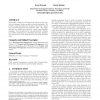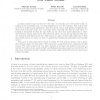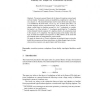108
click to vote
TLDI
2003
ACM
15 years 7 months ago
2003
ACM
We develop a logic for reasoning about adjacency and separation of memory blocks, as well as aliasing of pointers. We provide a memory model for our logic and present a sound set ...
146
click to vote
NMR
2004
Springer
15 years 7 months ago
2004
Springer
One of the crucial actions any reasoning system must undertake is the updating of its Knowledge Base (KB). This problem is usually referred to as the problem of belief change. The...
130
click to vote
JELIA
2004
Springer
15 years 7 months ago
2004
Springer
We briefly overview the most recent improvements we have incorporated to the existent implementations of the TAS methodology, the simplified ∆-tree representation of formulas i...
122
click to vote
CSL
2004
Springer
15 years 7 months ago
2004
Springer
Locality notions in logic say that the truth value of a formula can be determined locally, by looking at the isomorphism type of a small neighborhood of its free variables. Such n...
127
click to vote
CONCUR
2004
Springer
15 years 7 months ago
2004
Springer
We present a modular approach to defining logics for a wide variety of state-based systems. We use coalgebras to model the behaviour of systems, and modal logics to specify behavi...
116
click to vote
LPAR
2005
Springer
15 years 7 months ago
2005
Springer
We propose to build an automated reasoning system for first-order logic (FOL) by translating reasoning problems to a fragment of FOL called coherent logic (CL) and then solving t...
108
click to vote
FOSSACS
2005
Springer
15 years 7 months ago
2005
Springer
We present a general framework for logics of transition systems based on Stone duality. Transition systems are modelled as coalgebras for a functor T on a category X. The propositi...
112
click to vote
EPIA
2005
Springer
15 years 7 months ago
2005
Springer
In this paper, we investigate the link between logics of games and “mentalistic” logics of rational agency, in which agents are characterized in terms of attitudes such as beli...
BIRTHDAY
2005
Springer
15 years 7 months ago
2005
Springer
This paper addresses the question of factoring a logic into families of (generally simpler) components, estimating the top– down perspective, splitting, versus the bottom–up, s...
116
click to vote
TABLEAUX
2007
Springer
15 years 8 months ago
2007
Springer
Subintuitionistic logics are a class of logics defined by using Kripke models with more general conditions than those for intuitionistic logic. In this paper we study predicate lo...



